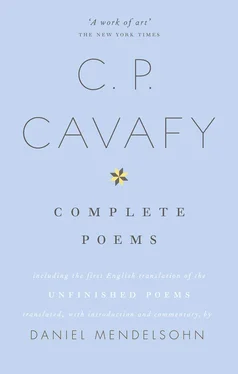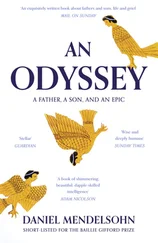may be prevailed upon to begin a sentence—an immense complicated yet shapely sentence, full of parentheses that never get mixed and of reservations that really do reserve; a sentence that moves with logic to its foreseen end, yet to an end that is always more vivid and thrilling than one foresaw. … It deals with the tricky behaviour of the Emperor Alexius Comnenus in 1096, or with olives, their possibilities and price, or with the fortunes of friends, or George Eliot, or the dialects of the interior of Asia Minor. It is delivered with equal ease in Greek, English, or French. And despite its intellectual richness and human outlook, despite the matured charity of its judgments, one feels that it too stands at a slight angle to the universe: it is the sentence of a poet.
It was, in other words, a life that was a bit of a hybrid: the fervent, unseen artistic activity, the increasingly tame pleasures of a middling bourgeois existence, the tawdry quartier, the abstruse, rather baroque conversation. Not coincidentally, the latter pair of adjectives well describes a particular literary manner—characteristic of the Hellenistic authors who flocked to the era’s cultural capital, and who were so beloved of Cavafy—known as “Alexandrian.”
In 1932, Cavafy, a lifelong smoker, was diagnosed with cancer of the larynx. That summer he traveled to Athens for the tracheotomy that would deprive him forever of the famous voice; from that point on, he was forced to communicate in a distorted whisper and, later on, by means of penciled notes. He returned home in the autumn, after declining an invitation from his wealthy friend Antony Benakis, a collector and the brother of Penelope Delta, to stay with him in Athens. (“Mohammed Aly Square is my aunt. Rue Cherif Pasha is my first cousin, and the Rue de Ramleh my second. How can I leave them?”) After first refusing and then allowing himself to be visited by the Patriarch of the city, he died in the Greek Hospital in Alexandria on April 29, 1933, his seventieth birthday: an elegant concentricity, a perfect closure, that are nicely suggested by what is said to have been his last act. For we are told that on one of the pieces of paper that had become his sole mode of communication he drew a circle; and then placed a small dot in the middle of that circle. Whatever he may have meant by that glyph, certain people will recognize in it an apt symbol. It is the conventional notation, used by authors when correcting printer’s proofs, for the insertion of a period, a full stop.
“IN THE POEMS of his youth and even certain poems of his middle age he quite often appears ordinary and lacking in any great distinction,” Seferis remarked during his 1946 lecture—another rather severe judgment whose underlying shrewdness cannot be denied, when we go back to so many of the poems Cavafy wrote in his thirties and even early forties, with their obvious debts to other writers and thinkers, their evasions and obfuscations. And then, as Seferis went on to say, “something extraordinary happens.” As will be evident by now, little about the external events of his life helps to account for that remarkable evolutionary leap; in this respect Cavafy resembles, more than a little, his near contemporary Proust, who similarly underwent a profound but invisible metamorphosis that, by his late forties, had transformed him from a dabbling littérateur into a major artist. Only by tracing the course of Cavafy’s interior life, his intellectual development, from the 1890s to the 1910s is it possible to discern the path by which (to paraphrase that other great Greek poet again) Cavafy went from being a mediocre writer to a great one.
In the 1880s and 1890s, when he was in his twenties and thirties, Constantine Cavafy was a young man with modest literary ambitions, steadily writing quantities of verse as well as contributing articles, reviews, and essays, most in Greek but some in English (a language in which he was perfectly at home as the result of those adolescent years spent in England), on a number of idiosyncratic subjects, to Alexandrian and Athenian journals. (“Coral from a Mythological Viewpoint,” “Give Back the Elgin Marbles,” Keats’s Lamia .) Such writings, as well as the historical poems that belong to this early period, already betray not only a deep familiarity with a broad range of modern historians, whom he read in Greek, English, and French, but also the meticulous attentiveness to primary sources in the original languages—the Classical and later Greek and Roman historians, the early Church Fathers, Byzantine chroniclers—that we tend to associate with scholars rather than poets.
The writings of those early years indicate that Cavafy was struggling to find an artistically satisfying way in which to unite the thematic strands that would come to characterize his work, of which the consuming interest in Hellenic history was merely one. (An interest, it is crucial to emphasize, that rather strikingly disdained the conventional view of what constituted “the glory that was Greece”—which is to say, the Archaic and Classical eras—in favor of the long post-Classical phase, from the Hellenistic monarchies through Late Antiquity to the fall of Byzantium.) There was, too, the poet’s very strong identity as a product of the Greek diaspora, an Orthodox Christian and the scion of that once-distinguished Phanariote family who saw, in the thousand-year arc of Byzantine history, not a decadent fall from idealized Classical heights—the standard Western European attitude, crystallized by Gibbon—but a continuous and coherent thread of Greek identity that seamlessly bound the antique past to the present.
And, finally, there was homosexual sensuality. However tormented and secretive he may have been about his desire for other men, Cavafy came, after a certain point in his career, to write about that desire with an unapologetic directness so unsensational, so matter-of-fact, that we can forget that barely ten years had passed since Oscar Wilde’s death when the first of these openly homoerotic poems was published. As the poet himself later acknowledged, he had to reach his late forties before he found a way to unify his passion for the past, his passion for “Hellenic” civilization, and his passion for other men in poems that met his rigorous standards for publication.
The earliest poems we have date to the poet’s late teens, the period when he was sojourning with his mother’s family in and around Constantinople. These include dutiful if unpersuasive exercises on Romantic themes (ecstatic encomia to the lovely eyes of fetching lasses; a Grecified adaptation of Lady Anne Barnard’s ballad on love and loss in the Highlands) and, perhaps predictably, some flights of Turkish Orientalism, complete with smoldering beauties locked up in harems. As time passed, he was drawn more and more to recent and contemporary currents in Continental literature. The Parnassian movement of the 1860s and 1870s, in particular, with its eager response to Théophile Gautier’s call for an “Art for Art’s sake,” its insistence on elevating polished form over earnest subjective, social, and political content, and particularly its invitation to a return to the milieus and models of the antique Mediterranean past, had special appeal. (That a number of Cavafy’s poems from this period are sonnets is surely a testament to the influence of the Parnassians, who prized the form for its rigorous technical requirements.)
From the Parnasse it was but a short step to Baudelaire, a Greek translation of whose “Correspondences” constitutes part of one 1892 poem; and, ultimately, to Symbolism. It is not hard to see the allure that the French writer’s elevation of the poet as a member of an elite—a gifted seer whose special perceptions were denied to the common mass—had for the young Cavafy, in whom a taste for the past, as well as a necessarily secret taste for specialized erotic pleasures, coexisted. Lines from the second half of “Correspondences According to Baudelaire” suggests how thoroughly the young Alexandrian had absorbed the lessons of the pioneering French modernist:
Читать дальше












